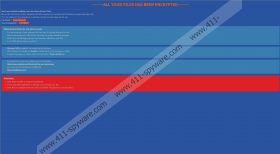Repter Ransomware Removal Guide
If your Windows operating system lacks comprehensive protection, Repter Ransomware is one of the many threats that could invade it. The worst part is that it could happen without your notice. Needless to say, if you do not discover and remove this malware instantly, it can go on to do terrible things. While all malicious threats can be dangerous in one way or another, ransomware endangers your personal files. This particular threat should encrypt all personal files (e.g., documents or photos), and it then should add the “.EMAIL=[repter@tuta.io]ID=[unique ID].repter” extension to their original names. Due to this, all you have to do is look at the name of your file to determine whether or not it was encrypted. Sadly, once your files are “locked,” you might be unable to unlock them, and even deleting Repter Ransomware cannot help. Hopefully, not all is lost.
Have you ever created copies of personal files? Have you stored these copies online or on external drives? If you have, once you remove Repter Ransomware from your operating system, you can use these backups as replacements. This is the ideal situation. Unfortunately, not all Windows users are this careful about their files’ security. If you are one of those users who do not use backups, you are in trouble. As soon as all personal files are encrypted with Salsa20 and RSA 4098 encryption keys, a file named “# How To Decrypt Files #.hta” is dropped next to them. Every folder containing the encrypted files should have a copy of this file. When you open it, it shows a message from the attackers, and you have to be very careful about how you take it. Sadly, if you have no way to replace files, you might decide to pay attention to the message even if you know that that is risky.
The Repter Ransomware message informs that your files were encrypted and that you now, supposedly, need a “decryptor tool and unique key” to recover them. The attackers suggest emailing them at repter@tuta.io (or Repter@elude.in) within two days to get information about the ransom payment. You are supposed to pay it in Bitcoin, and the attackers also suggest sending three files along with the original message so that they could be decrypted for free. Corresponding with cybercriminals is dangerous because they could scam you and terrorize you forever, until you are forced to switch to a new email account. Unfortunately, if you do not understand the risk, and if three of your files come back decrypted, you might start trusting cybercriminals. You might think that you have no other choice. Well, even if it means that you end up losing all files, we do not recommend following the cybercriminals’ lead. They are likely to dupe you and leave you empty-handed anyway.
There are not too many Repter Ransomware components that need to be deleted, but the most important one, which is the launcher, can be impossible to identify. We cannot say where it was dropped, and we warn you that its name could be random. It also could take on the name of a familiar file to confuse you and avoid removal. If you are able to find and remove Repter Ransomware manually, by all means, go for it. If you are not able to do that, do not hesitate to implement a legitimate anti-malware application. It will instantly delete malicious files and, most importantly, help you secure your system to prevent new threats from slithering in. Just to be safe, get in the habit of backing up important files because you do not want to lose them in the future. If there is anything else that we could help you with, please do not hesitate to leave a comment below.
How to delete Repter Ransomware
- Delete recently downloaded suspicious files.
- Delete the file called # How To Decrypt Files #.hta (copies exist).
- Delete these files from the Desktop: Cpriv.key, Cpub.key, SystemID.
- Empty Recycle Bin to complete the removal process.
- Run a malware scanner to perform a complete system scan.
Repter Ransomware Screenshots:


